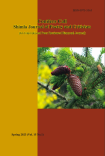Ontological Exploration of Jean Rhys in Wide Sargasso Sea
The existential values have always been questioned until a struggle is formulated and identical venture is not achieved. Ontology is the philosophical study of the nature of being, existence or reality in general, as well as of the basic categories of being and their relations. Meanwhile, all the relations including human, historical, social or all…

